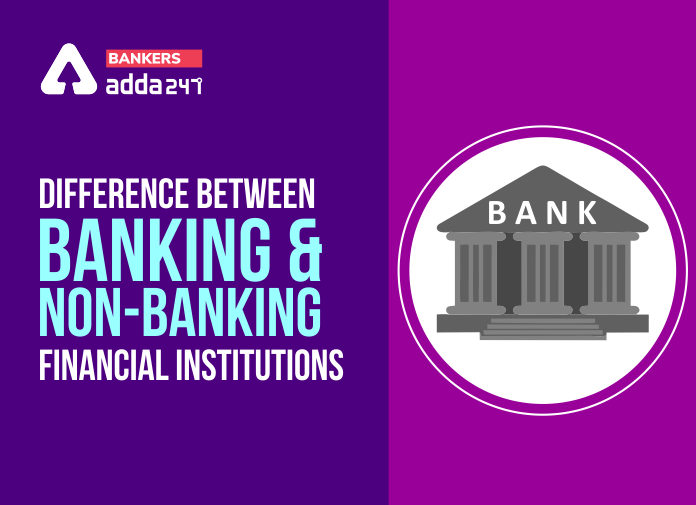Banks and financial institutions or NBFCs have been there long enough. They have been the financial intermediaries for depositors, borrowers, and others. The banks will benefit in exchange for the services they provide and also add on commission rates as well. They charge interest to the borrower, and they would be giving a lesser rate of interest to the depositor. The difference is what the bank earns.
Difference Between Banking and Non-Banking Financial Companies (NBFCs)
The banks offer a variety of services such as
- Savings accounts
- Provisions for fixed deposits
- Commercial accounts
- Personal and business loans
- Mortgages
- Credit and debit cards
| What Are NBFC And Their Functions | Different Types of Bank Accounts & their features | Different Types of Banking | List of Public Sector Banks in India |
Other financial institutions or non-banking finance companies popularly known as NBFCs provide similar banking services but don’t come under the legal definitions of being a bank. These are known as non-banking financial institutions. They too play an essential role in the monetary sector and for the economy to run efficiently. They may also operate without a license as well. Few of them are listed below
- Payday lenders
- Insurance firms
- Currency exchanges
- Check-cashing services
- Hedge funds
- Pawnshops
The non-banking financial institutions have a more comprehensive customer range. Sometimes some customers may not fall into the criteria of their standards. Hence these financial institutions have a better chance of providing solutions for such customers.
Examples being
- A customer may not have enough funds to maintain a minimum balance hence can’t open an account in a traditional bank
- People in the low-income category who find it hard to get loans easily opt for non-banking financial institutions
- People having low credit score also find it difficult to obtain credit from the banks. Hence non-banking institutions provide a great alternative
- Hedge funds emphasize the potential returns over the risk of the investment. The unregulated manner of the non-banking institution allows the managers to have a boost in chances to get a higher payout than a bank which will not offer such an opportunity in any case, that is if the bet pays off.
| Banks | NBFC | |
| Definition | Banks are govt. authorized financial intermediary providing all sorts of banking services to the people. | NBFC does not hold a bank license but yet can provide financial service to people. |
| RBI’s FAQs | Click Here | Click Here |
| Demand Deposit | Accepeted | Does not accept |
| Foreign Investment | Allowed up to 74% for private sector banks | up to 100% is allowed |
| Maintenance of Reserve Ratios | Mandatory | Not Required |
| Credit creation | Banks create credit | NBFC do not create credit |
What you can expect from traditional banking ?
The banks are highly regulated, and top banks of the country are nationalized, which means under government control. The regulations put an impediment in the number of risks as well as kind of the risks the banks would be able to take when investing or lending. Their policies will not accommodate the flexibility to bend regulations or work out differently when the opportunity arises in the money market.
Individuals with poor credit find it very difficult to get any bank to lend money even for a higher rate of interest. The banks have fixed rates for lending and the amount to lend, and they can’t go beyond that because of capital requirements.
The banks that do business overseas have a significant impact due to the regulations as there is frequent fluctuation in the currency market, and the dollar being a strong competition for most currencies will put the banks in less than a competitive place. The service charges have increased over time, which makes it expensive to deal with traditional banks.
What do non-banking financial institutions provide?
Since the non-banking institutions take up more risks compared to the bank in terms of
- Lending to people with low or zero credit score
- May not need security for some types of the loans they lend
- Provide flexible rates of interest and installments
- A time period of payback also can be negotiated for each loan
When non-banking institutions have relaxed on so many levels to provide loans and other banking options, there is bound to be a kickback for them as well. They do so by charging a higher rate of interest. Sometimes it may seem excessive, but sometimes the customer may have no choice when no banks are ready to lend, it would be their only resort to check on these non-banking institutions for some kind of relief. You will have to know that the accounts are insured, and even encashing a paycheck would cost you a fee from such institutions.
Click Here to Register for Bank Exams 2020 Preparation Material
Join Latest Live Batches to Prepare for Bank Exams



 Weekly Current Affairs One Liners 23rd t...
Weekly Current Affairs One Liners 23rd t...
 CSIR CRRI Typing Test 2025 Date for JSA ...
CSIR CRRI Typing Test 2025 Date for JSA ...
 Can Final Year Students Apply for SBI PO...
Can Final Year Students Apply for SBI PO...


